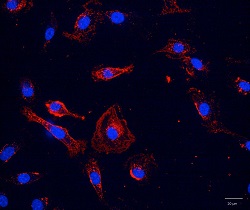Liposome-encapsulated drugs for efficient and prolonged delivery
In many cases, non-specific delivery of drugs to normal or sensitive tissues causes significant side-effects. In addition, this may mean that the active ingredient is not bioavailable throughout the body and as a result it inefficiently targets the tissue or organ of interest. Ideally, a drug delivery system should be safe, non-immunogenic and provide targeted delivery of the compound of interest. Nanocapsules have emerged as suitable carriers of drugs as they provide a cavity for the pharmaceutical surrounded by a natural or synthetic membrane. The development and optimisation of nanocapsule fabrication and functionalisation is a field of intensive research. Innovative technology for nanocapsule generation Liposomes are widely used as delivery vehicles of peptides, proteins, and other active substances for pharmaceutical and biochemical purposes. However, alongside phospholipids their main drawback is they initiate immune responses mainly by activating the complement system. To address this, scientists with the EU-funded DECENT AID project developed a new nanocapsule production technology using centrifugation, colloidal and fluid mechanical techniques. ‘These novel nanocapsules should be especially suited for proteins and other sensitive biomolecules which are vulnerable to degradation by existing encapsulation technologies.’ project coordinator Dr Leneweit explains. The researchers used proteins as active pharmaceutical ingredients in nanoemulsions with phospholipids as emulsifiers. These were then centrifuged to produce asymmetric nanocapsules through a specialised technique that combines an in situ optical system. Characterisation with respect to size, polydispersity, encapsulation efficiency for hydrophilic drugs, and asymmetry of the nanocapsule shell produced an unexpected find. The consortium discovered that the density and organisation of phospholipids into monolayers or multilayers depended on the interaction between water and the organic solvent used. The newly discovered mode of interaction is likely to play a role in fat transport in blood circulation and the early stages of artherosclerosis, as published in the research journal ‘Langmuir’. Given the capacity of liposomes to activate the complement, researchers tested the immunogenicity of empty liposome nanocapsules in vitro and in vivo, and investigated the mechanism of immune reactivity. To minimise immune attack by the complement, coagulation and the phagocytic systems, as well as prolong circulation in the blood, the nanocapsules were coated with heparin, a polymer cover also found naturally in the human body. Being biodegradable and non-immunogenic, the cover avoids accelerated blood clearance upon repeated administration of nanocapsules. The novel protective system proved to be stable in buffer, plasma and whole human blood. The polymer-coated liposome nanocapsules were also tested against non-coated nanocapsules for in vivo immunogenicity. Drug distribution and efficiency were screened in various mouse models including one for cancer. Results showed a novel mechanism of complement-mediated clearance of unprotected nanocapsules, underscoring the importance of natural polymers for conferring immune resistance. Industrial scale-up The DECENT AID approach achieved encapsulation efficiencies of up to 95 % and bilayer asymmetries of up to 82 %. ‘Our results give the perspective to develop an industrial scale-up and to achieve technologies for the encapsulation of sensitive active pharmaceutical ingredients into nanocapsules in unmet quality,’ Dr Leneweit comments. The consortium plans to establish procedures of continuously operating centrifugal devices to enable industrial production of the nanocapsules. Collectively, the DECENT AID asymmetric nanocapsules and polymer protection system have successfully addressed a gap in the field of drug delivery. The properties of the nanocapsules make them ideal for sensitive active pharmaceutical ingredients such as those used in cancer therapy.







